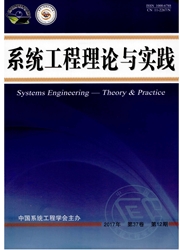

 中文摘要:
中文摘要:
因子效应原则(效应稀疏原则、效应排序原则和效应遗传原则)经常用于评判因子设计理论与数据分析策略的合理性.针对非正态响应的部分因子试验,当筛选试验含有复杂的别名效应时:提出了一种结合广义线性模型(generalizedlinearmodels,GLM)与因子效应原则的多阶段贝叶斯变量选择方法.首先,在广义线性模型的线性预测器中对每个变量设置一个二元变量指示器;其次:将因子效应原则以变量指示器的先验信息分成三个不同的阶段分别加以考虑;然后,利用变量指示器的后验概率识别显著性的因子效应.最后,仿真试验结果表明:所提出的方法不仅能简化广义线性模型先验参数的选择,而且能够有效地识别出非正态响应部分因子试验的显著性因子.
 英文摘要:
英文摘要:
Factorial effect principles (effect sparsity principle, effect hierarchy principle and effect heredity principle) are often used to justify the rationality of factorial design theory and data analysis strategies. As for fractional factorial experiments with non-normal responses, this paper proposed a multi-stage Bayesian variable selection (BVS) approach combining generalized linear models (GLM) with the factorial effect principles when there are complex aliasing effects in screening experiments. Firstly, a binary variable indicator was used for each variable of the linear predicator in GLM. Secondly, the prior information of the variable indicators was considered in three different stages through the factorial effect principles respectively. Thirdly, significant factors could be identified by the posterior probabilities of the variable indicators in GLM. Finally, the results of a simulation experiment demonstrated that the proposed method not only can simplify the prior set for the parameters in GLM, but also can effectively identify significant factors in the fractional factorial experiment design with non-normal responses.
 同期刊论文项目
同期刊论文项目
 同项目期刊论文
同项目期刊论文
 Economic and economic-statistical designs of an (X)over-bar control chart for two-unit series system
Economic and economic-statistical designs of an (X)over-bar control chart for two-unit series system Optimizing production and inventory decisions in a supply chain with lot size, production rate and l
Optimizing production and inventory decisions in a supply chain with lot size, production rate and l 期刊信息
期刊信息
